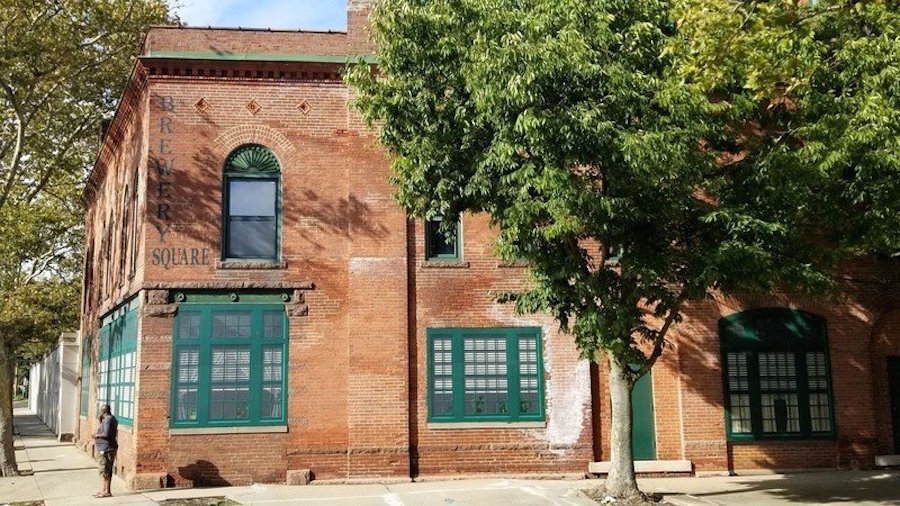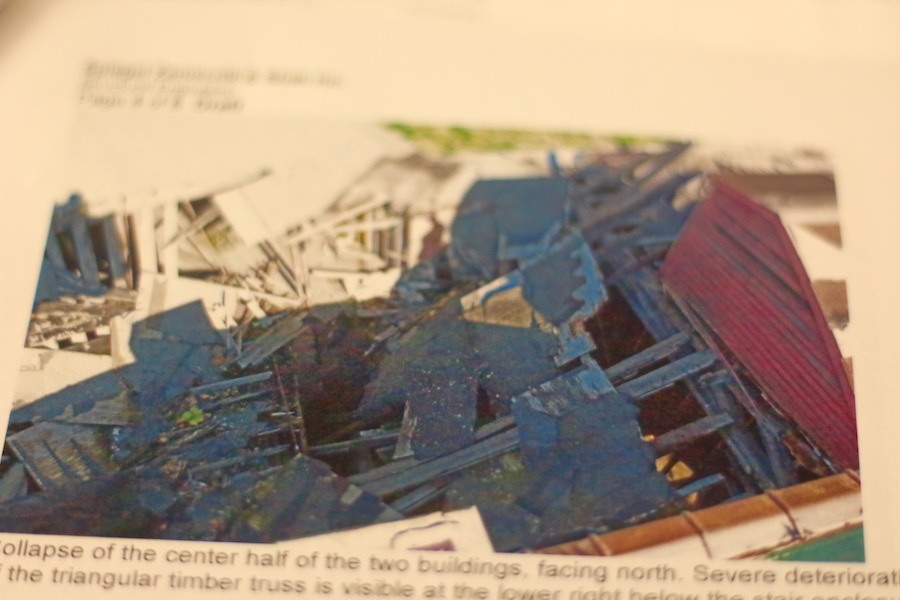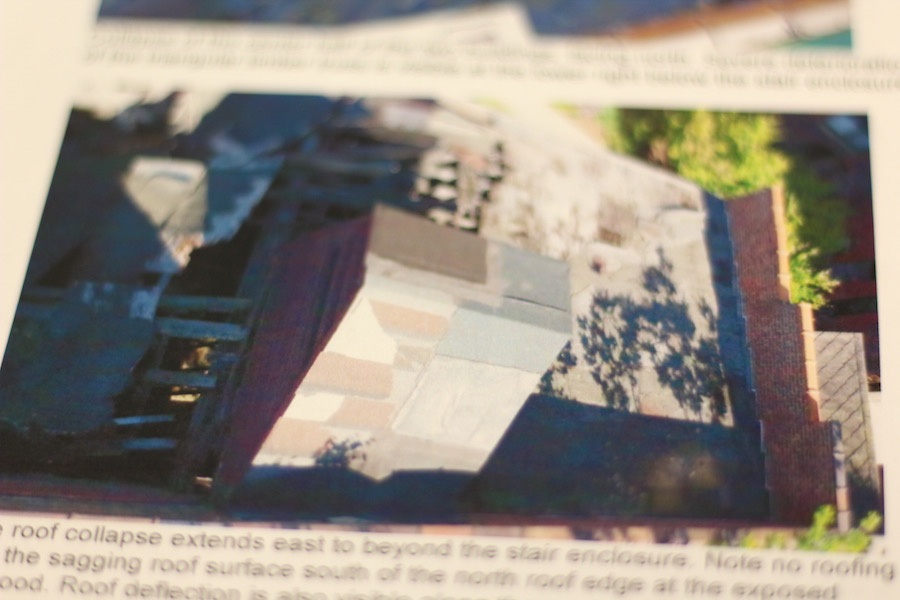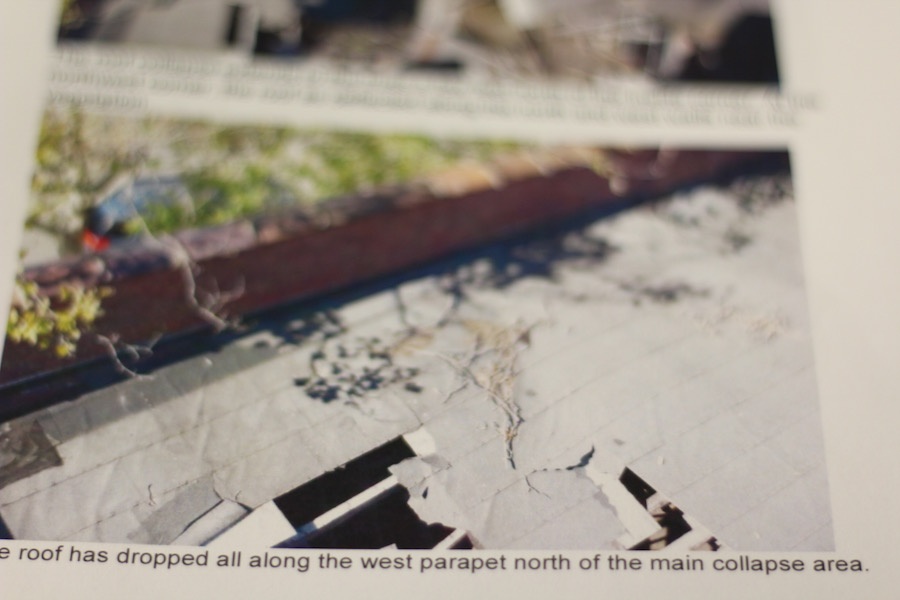
Fair Haven | Architecture | Arts & Culture | New Haven Preservation Trust

| New Haven Preservation Trust Photo. |
This is an updated version of a story that we ran in late November.
Attempts from both city and state preservationists have been unsuccessful in stopping the demolition of a historic building in Fair Haven, slated to begin tomorrow before any more possible freezes during the winter months.
That’s the story for a historic gatehouse at 23 River St., a section of the Brewery Square Apartments complex that has been vacant for the last three decades. On Nov. 14, the city’s Building Department issued an emergency order for demolition of the building based on concerns for public safety. This week, Building Official Jim Turcio issued the permit to make that demolition a reality.
Prior to the permit, historic preservation officials and preservation enthusiasts from the New Haven Preservation Trust (NHPT) and State Historic Preservation Office (SHPO) had launched a petition to save the gatehouse, citing its status on the National Register of Historic Places and longtime neglect by Cambridge, Mass.-based landlords Brewery Square Gatehouse Limited Partnership.
“Our feelings are that the property owners have let the building get to the point that it has to be demolished,” said NHPT Preservation Services Officer Elizabeth Holt, reached by phone in November. “We believe the building can be saved, and that there are other options.”
A month later, she said she is disappointed but taking it as a call to action for other historic buildings in the city.
"We really would just want to thank everyone who supported our efforts, but I would also like to remind people that we don't want this to be the end of the story," she added. "After the gatehouse is gone, we don’t just want to move on."

| An observational analysis from New Haven-based Spiegel Zamecnik & Shah Inc. documented collapsed sections of the floor and roof, walls that had come away from the ceilings, and points of entry that were no longer safe. Lucy Gellman Photos from the report. |
For the past four years, the building has perhaps best been known by the images painted on boards securing the building, giving the appearance of windows. While New Haven's City Plan Commission ordered that the property owners submit a "renovation and lease up plan" of the gatehouse as part of a deal with the city in June 2014, no such plan was ever submitted by the property manager. Brewery Square Gatehouse Limited Partnership did not respond to multiple requests for comment.
Reached by phone in November, Turcio noted caved-in sections of roof and places where the floors are coming apart from the walls. He said that “it doesn’t look good” for the building, originally built at the turn of the 20th century. He also said that while preservationists have long been referring to the location as a gatehouse, it is in fact a warehouse.
 But between the order and the permit, members of the NHPT and SHPO staff made an effort to claim demolition by neglect—that Brewery Square Gatehouse Limited Partnership intentionally allowed the building to decay, to get around state preservation regulations. They also looked into using the Connecticut Environmental Policy Act (CEPA) to argue for “feasible or prudent alternatives” for the building, which would have required an environmental assessment from the state before demolition.
But between the order and the permit, members of the NHPT and SHPO staff made an effort to claim demolition by neglect—that Brewery Square Gatehouse Limited Partnership intentionally allowed the building to decay, to get around state preservation regulations. They also looked into using the Connecticut Environmental Policy Act (CEPA) to argue for “feasible or prudent alternatives” for the building, which would have required an environmental assessment from the state before demolition.
Discussions around the gatehouse’s proposed demolition go back to August of this year, when the property owners requested a Certificate of Appropriateness to demolish the property from the Historic District Commission (HDC), an all-volunteer group that supervises and makes decisions on New Haven’s designated historic districts. Representing the partnership, New Haven-based lawyer Stuart Margolis argued that the building was in danger of immediate collapse and needed to be demolished as a matter of public safety.
He presented findings from an observational site investigation that Waltham, Mass.-based engineering firm Souza True & Partners had completed in 2017 (the firm later added updates in September of this year), ordered by Brewery Square Gatehouse Limited Partnership to determine the feasibility of a renovation.
“In our professional opinion, at this time, the only reasonable economic solution for this structure is demolition.” a representative of the firm later wrote to Margolis. “The entire structure is beyond redemption without the influx of substantial amounts of capital.”

When the request came before them in August, said Holt, members of the HDC did not grant the certificate. Minutes from that meeting and a subsequent one on Sept. 14, both of which contain more information, were never approved and are not yet available to the public.
Then on Sept. 13 of this year, Margolis requested that Turcio authorize the immediate demolition of the structure. In October—and with pending winter weather in mind—the city’s building department conducted another observational survey of the property and damages, working with structural engineers from New Haven-based Spiegel Zamecnik & Shah Inc. and a ladder truck from the New Haven Fire Department, which also took drone photographs of the building.
After inspecting the building on Oct. 17, they issued a report to Turcio that chronicled rotting and collapsed sections of the roof and floor, reduced or severed connection between the roof and the walls, heavy water damage, eight to 12-inch masonry that would no longer withstand a heavy wind load, and multiple points of entry that were no longer safe.
Because engineers were unable to enter the building (“safe entry was not possible”), demolition inspector Jose Romero and Spiegel Zamecnik & Shah Inc. principal engineer David Carlson made their observations from a New Haven Fire Department ladder truck. Images were taken from above.
“Based on our observations it is evident building framing has been severely deteriorated by a very long period of moisture entry,” a section of their final report, submitted to Turcio at the end of October, read. “Access into the main west and south buildings should not be allowed, and in our judgement they are unsafe and potentially instable [sic] in a high wind incident.”
“It is unlikely that the interior framing is salvageable due to deterioration from the long term water entry,” it added.
Michael Piscitelli, deputy economic development administrator for the city, did not respond to multiple requests for comment. According to city spokesperson Laurence Grotheer, city officials were initially split on the demolition.
“There is among some a sensitivity to the historic value of that building,” he said in an interview right before Thanksgiving. “On its face, it’s an historic structure. Aesthetically, there’s attention to the continuity of the brick facade in that area. But there’s a growing concern over the extent to which the building poses a public safety concern.”
“Coupled with the calendar—the freezing and thawing and snow and ice add to the concern,” he added. “There is safety to the priority of the preservationists. But the city has a public safety responsibility that cannot be ignored.”
Click here to read a story on the demolition by Allan Appel of the New Haven Independent.

